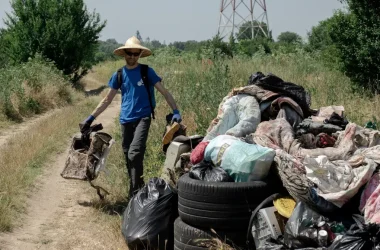Wildlife in Romania, an essential component of biodiversity, risks a precipitous decline, warns WWF-Romania (World Wide Fund for Nature), the largest environmental organization in the world dealing with the protection and conservation of nature. In the country’s forests and waters, iconic species such as the brown bear, lynx, wolf, bison, otter, or sturgeon are threatened by climate change, pollution, illegal deforestation, poaching, and habitat fragmentation. This worrying reality has devastating consequences on biodiversity and the ecological balance, and as there is a strong interdependence between nature and man, the health and well-being of Romanians will be affected in the long term.
„Wild species suffer from habitat fragmentation. Disruption of the functionality of ecological corridors leads to various types of conflicts, including collisions between vehicles and wildlife species, endangering the safety of people. Human intrusion into wildlife habitats (especially by motorized means), anthropogenic food supply, and others affect not only the distribution but also the behaviors of animals, often resulting in unwanted conflicts between humans and wildlife species. At the same time, climate change will have an increasingly difficult word to say, influencing their feeding patterns, hibernation of certain species, distribution, and others”, explains Dr. Cristian-Remus Papp, National Manager of Wild Species and Protected Areas within WWF-Romania.
Wildlife extinction and impacts on human health and well-being
Recently, WWF – World Wide Fund for Nature emphasized, through the Living Planet Report study, that the next 5 years are crucial for human life on Earth because the planet is reaching the most advanced level of degradation in the Anthropocene, under the conditions in which saw a 73% decline in wild species populations worldwide in just 50 years. The effects are felt increasingly acutely in Romania, which must take early measures to protect nature, wild animals, and its citizens.
Without wildlife, forest and freshwater ecosystems, and all of nature in general, cannot function optimally. Biodiversity loss will adversely affect people’s quality of life, from limiting vital resources to degrading mental and physical health.
In Romania, the excessive use of pesticides, intensive agriculture, poaching, the development of an unsustainable infrastructure without considering the long-term impact on the environment, illegal logging, or plastic pollution, to which are added decisions that put political interest before recommendations based on science, as in the case of the recently adopted law that allows trophy hunting for the bear species (and not the problematic specimens, which are usually smaller in size), bring a serious service to wildlife and ecosystem health.
The expansion of the road and highway network, residential development without regard to natural protected areas, and ecological corridors pose a critical threat to the country’s biodiversity by fragmenting natural ecosystems. These infrastructure projects create barriers that interrupt the functionality of wildlife travel corridors, leading to increased human-animal conflicts and unwanted road accidents, with often devastating losses of people and wildlife that end up on the roads. Therefore, the isolation of wildlife populations due to habitat fragmentation has profound consequences, potentially contributing to the genetic isolation and reduced long-term viability of many animal species.
Unsustainable exploitation of natural resources continues to pose a major environmental threat. Intensive agricultural practices are depleting vital water resources (and thus affected by pedological drought) at an alarming rate, and the increasing pressure from this sector of activity leads to the accelerated degradation of natural habitats. This pressure is systematically eroding crucial areas for numerous protected species, some endangered, undermining decades of conservation efforts and threatening Romania’s natural heritage.
While initiatives to use renewable energy are crucial for a sustainable future, their implementation must be carefully evaluated in terms of environmental impact. Many small-scale hydroelectric projects on Romania’s wild rivers exemplify how seemingly „green” solutions can magnify environmental challenges. These facilities, while generating minimal energy production, create significant ecological disruption by blocking crucial routes of migration for iconic species such as Danube sturgeon and downstream water quality deterioration The resulting changes in natural water flows compromise vital ecosystem services, including the natural prevention of flooding and water purification, demonstrating how poorly planned environmental solutions can ultimately undermine the very systems they aim to protect.
On the Danube, the large infrastructure projects seriously endanger the ecosystem balance, calling into question the efforts of WWF-Romania to restore the sturgeon populations, through the programs that planned the repopulation in the next four years with 900,000 sturgeon fry. Sturgeon migration routes are often blocked by physical barriers such as dams, and thus traditional spawning grounds become inaccessible and populations end up facing the negative effects of inbreeding and loss of genetic variability and viability.
“Our children’s future depends on a healthy natural environment, and that means taking action now to protect wildlife and nature in general. Without our active involvement, our children will inherit a degraded nature, devoid of the richness and stability offered by natural ecosystems. We must become parents to nature as well, giving it the support it needs to thrive and sustain us in turn. We always think about the future of our children, but we forget that without a healthy nature, that future is bleak. It’s time to be parents not only for our children but also for Mother Nature, who needs support for our good, for all of us”, declares Hanny Bratu, Public Engagement and Resource Mobilization Director within WWF-Romania.
The sustained efforts of WWF-Romania (World Wide Fund for Nature) over the last decade have marked remarkable progress in the conservation of the country’s emblematic species. The bison reintroduction project in the South-West Carpathians represents one of the most important achievements in the conservation of European biodiversity. Only 10 years after the first reintroduction, the number of free bison in the wild of the Țarcu Mountains exceeded 200 specimens. In the autumn of 2023, a few specimens naturally settled in Domogled Valea Cernei National Park, clear proof that the species adapts and integrates into the ecosystem.
In the field of sturgeon conservation, WWF-Romania achieved notable successes by implementing innovative protection measures. By working closely with fishing communities and authorities, the organization has made a significant contribution to combating poaching and protecting the migration routes of these „living fossils”. Monitoring through modern technologies and awareness programs have played a crucial role in the survival of these ancestral species in the Danube waters.
At Băile Tușnad, the pilot project implemented by WWF-Romania (World Wide Fund for Nature) together with the local authorities and stakeholders in the area, transformed the locality into the first „bear smart” city in Europe. Started two years ago, the initiative managed to reduce the number of human-bear conflicts to zero, becoming a model that can be replicated in all localities with high bear densities, both in Romania and in Europe. However, isolated successes are not enough.
„Romania is at a decisive moment for the future of its natural heritage. Despite the complex challenges we face – from illegal logging to plastic pollution to controversial legislative initiatives on trophy bear hunting – we remain firmly committed to the mission of protecting and restoring degraded ecosystems and populations of valuable species in the country, such as sturgeons and bison. The decisions we make today will have a considerable impact on wildlife. It is also about charismatic species, such as the bear, or representatives of aquatic fauna species, often overlooked, but vital for the natural balance of rivers. Restoring rivers, lakes, ponds, and wetlands in general, is not only a necessity for the conservation of biodiversity but also an essential solution for combating floods and droughts, increasingly frequent problems due to climate change. Through coordinated measures and strategic investments in nature-based solutions, we can create a Romania where biodiversity thrives and human communities benefit directly from a healthy environment”, said Barbara Bendandi, Director of Conservation WWF-Romania.
In Romania, it is necessary to continue the implementation of viable measures to save wild species, such as the reintegration of bison into the wild and the restoration of tourist routes to avoid dangerous encounters between humans and bears. In this context, WWF-Romania (World Wide Fund for Nature) launched the campaign ” Mother Nature needs mothers and fathers ” , a call for responsibility, empathy, and understanding that the dangers and risks faced by wild animals push them beyond their limits, with catastrophic consequences, and the power and opportunity to create a resilient nature for children’s future lies right in the hands of today’s parents.









